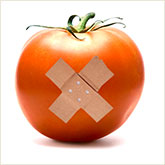When Food Fights Back
By DeLane McDuffie
From Team Beachbody - Click here for resources, tools and
information to help you to reach your health, fitness and positive lifestyle
goals!
 The next time you bite into a piece of fruit,
consider its feelings. Now apologize. What did it ever do to you but make you
healthier? For centuries, we've cooked, shredded, chopped up, grilled, and
sautéed food. And you know that ain't right. They don't deserve to be
set ablaze or mutilated. Well, this time, they're out for revenge. Over time,
food and beverages have been slowly but surely strengthening their resistance
against human imperialism. So watch yourself out there, buddy, and match the
food or beverage with the place it attacked. You've been warned. The next time you bite into a piece of fruit,
consider its feelings. Now apologize. What did it ever do to you but make you
healthier? For centuries, we've cooked, shredded, chopped up, grilled, and
sautéed food. And you know that ain't right. They don't deserve to be
set ablaze or mutilated. Well, this time, they're out for revenge. Over time,
food and beverages have been slowly but surely strengthening their resistance
against human imperialism. So watch yourself out there, buddy, and match the
food or beverage with the place it attacked. You've been warned.
- Molasses
– Boston. The Great Molasses Flood of 1919. No
joke. The Purity Distilling Company of Boston's North End stored 2.5 million
gallons of molasses in their 58-foot-high tank (about as tall as a six-story
building). The molasses was to be used as a sweetener and to make ethyl alcohol
for liquor and weapons. On January 15, a mysterious explosion within the tank
caused a molasses tsunami. Clocking a syrup land speed record of 35 mph, waves
up to 15 feet ripped through the streets; flipped over cars, horses, and
buggies; pushed a train off its tracks; and knocked down a few buildings, thus
marking the only time that the phrase "slower than molasses" didn't apply to
molasses. There were 21 deaths and a reported 150 people injured. Through a
completely unrelated event, Congress passed the 18th Amendment the very next
day, ushering in the immensely popular Prohibition Era.
- Mushroom/Fungi – Pont-Saint-Esprit.
Back in August 1951, the residents of the small
village of Pont-Saint-Esprit (Bridge of the Holy Spirit), France were chomping
on the bread from Mr. Roch Briand's bakery, as usual. Little did they know that
a rare ergot fungus had contaminated that year's local rye crops. Uh-oh.
Several of the 4,400 residents suddenly underwent hallucinogenic symptoms. Some
had convulsions, ran aimlessly through the streets, yelled that red flowers
were growing out of their bodies and their heads were melting, and attempted
suicide. In the Middle Ages, ergot poisoning was called "St. Anthony's Fire."
Ergot restricts blood flow to the appendages and can cause gangrene. If not
treated, victims can feel like they're Joan of Arc being burned alive, before
their extremities rot off. In the end, seven people died, while the sick and
injured numbered in the hundreds.
- Porter
– London. Meux's Brewery Company owned a
22-foot-high vat that held 511,920 liters of porter (a dark malt beer), which
was surrounded by several other vats of beer. On October 17, 1814, one of the
metal hoops that held it together snapped. The vat exploded, the exiting beer
crashed into and shattered the other vats, and the neighborhood below never
knew what hit it. The beer tidal wave, totaling 1,224,000 liters, splashed down
on the slum area of St. Giles, obliterating two homes and a pub. The first
casualty was the pub's 14-year-old barmaid Eleanor Cooper. As flood victims
began arriving at the local hospital, the current patients smelled the
overwhelming scent of beer and nearly incited a riot, declaring that they were
missing out on an impromptu Oktoberfest and demanding to be served. Eight
people drowned, while one died from alcohol poisoning. It was months before the
beer stench dissipated. The affected families of the drowned were so poor that
they displayed the corpses of their relatives for public viewing, charging
admission.
- Whisky
– Dublin. The June 26, 1875, edition of The
Illustrated London News tells the account of nearly 560,000 liters of
whisky covering several streets in the Liberties section of town. That may
sound like heaven to hard-core liquor lovers. Too bad it was a real-life River
Styx—a river of fiery, frisky whisky. It was a free-for-all. Local Scots
were scooping up what they could in their boots and hats. Four folks died from
swallowing the hot lava-like whisky, probably forgetting that it was hot
lava-like whisky. The families of destroyed houses and property were later
compensated.
- Tomatoes
– The World. October 1978 was a dark,
frightening time. American troops were deployed to the San Diego area to thwart
the efforts of a growing insurgency. The president even had to organize a
special task force of military experts and scientists to neutralize the
resistance. Ordinary citizens and soldiers perished and struggled in vain while
law enforcement was rendered helpless, as even its artillery could not stop the
enemy. However, this red army was eventually stopped and defeated—by the
horrible, horrible song "Puberty Love." The next thing that happened . . . was
. . . um . . . I'll stop now. Nothing else happened. This is just the plot of
the B-movie spoof Attack of the Killer Tomatoes. Just seeing if you
were paying attention. You were.
|
|